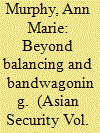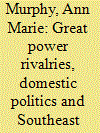| Srl | Item |
| 1 |
ID:
093983


|
|
|
|
|
| Publication |
2010.
|
| Summary/Abstract |
This article examines Thailand's response to China's rise. Contrary to predictions made by power transition theories that states respond to rising powers by balancing against or bandwagoning with them, Thailand has reacted to China's rise with no fundamental change in its alignment posture. Thailand sees little threat but much opportunity in China's rise. Thailand is clearly not balancing; it has taken few measures to enhance its military capability or strengthen its alliance with the United States. This article argues that Thai policy can be classified as bandwagoning only under definitions that cannot be distinguished from foreign policy writ large. The policy implications of these findings are that the United States should not to take access to Thai bases or Thai support for a balancing coalition against China for granted.
|
|
|
|
|
|
|
|
|
|
|
|
|
|
|
|
| 2 |
ID:
105380


|
|
|
|
|
| Publication |
2011.
|
| Summary/Abstract |
In his seminal work Bridging the Gap: Theory and Practice in Foreign Policy, Alexander George (1993) lamented the great divide between academia and the foreign policymaking community, arguing that greater interaction between scholars and policymakers would produce better policy. We share George's belief that scholars and practitioners each have much to offer the other. In fact, a wide spectrum of opportunities exists for scholars in the field of political science to engage in meaningful public service that can enhance every aspect of their careers, as well as contribute to international understanding.
|
|
|
|
|
|
|
|
|
|
|
|
|
|
|
|
| 3 |
ID:
155394


|
|
|
|
|
| Summary/Abstract |
Southeast Asian states increasingly face a strategic environment characterized by rising Sino-American tensions at the same time that domestic factors are increasingly influencing foreign policy. In recent decades, Southeast Asian states have sought to maintain their strategic autonomy by adopting hedging strategies to secure economic and security benefits from different partners. Since hedging is a rational response to strategic uncertainty, one would predict that as China’s assertiveness in the South China Sea has made clear its intentions to revise the status quo in ways that directly threaten the national interests of the Philippines Vietnam, Malaysia, and Indonesia, that they would begin to balance against China, in part by improving ties with Washington. In contrast to these predictions, no Southeast Asian country is balancing against China today, partly because of the economic incentives offered by China and partly because of the disincentives created by US pressure on democracy and human rights. In the Philippines, Duterte’s strategic re-orientation away from the United States toward China was triggered partly by US condemnation of his bloody war on drugs while US criticism of Thailand’s military coup has weakened the alliance. The unprecedented role of public pressure, interest groups and legislatures is forcing Southeast Asian leaders to publically debate policy decisions long made in private. Public opinion in Southeast Asia has often been anti-American but anti-Chinese sentiment is rising. As domestic and foreign policy becomes increasingly intertwined, Southeast Asian foreign policy is likely to continue to deviate from structurally based alignment predictions and become more erratic.
|
|
|
|
|
|
|
|
|
|
|
|
|
|
|
|
| 4 |
ID:
087656


|
|
|
|
|
| Publication |
2009.
|
| Summary/Abstract |
Indonesia, the world's fourth largest country, third largest democracy and home to the world's largest community of Muslims, has returned to the international stage. Indonesia's membership in a number of important global communities-it resides physically in Asia but is part of the broader Muslim world, the developing world, and the community of democracies-makes it an important international actor. Many Americans assume that common democratic values will translate into shared foreign policy goals and cooperation between the United States and Indonesia. The two countries do share significant interests, such as counter terrorism, maritime security, and a wariness of China, but also hold starkly different positions on the Middle East peace process and global trade issues. Democracy provides opportunities for the two-thirds of Indonesians who hold anti-American views to influence foreign policy, making it costly for Indonesian leaders to cooperate with the United States. Indonesia's return is good news for America, but the relationship needs to be managed skillfully to maximize benefits for both sides.
|
|
|
|
|
|
|
|
|
|
|
|
|
|
|
|
| 5 |
ID:
099942


|
|
|
|
|
| Publication |
2010.
|
| Summary/Abstract |
Over the past decade US relations with Indonesia have undergone a dramatic rapprochement such that today officials in both countries claim relations are at an all time high. Indonesia's transition to democracy and its adoption of effective counter-terrorism strategies laid the basis for the rapprochement. At a time when the Bush Doctrine advocated democracy as an antidote to terrorism, the Indonesian experience appeared to vindicate the logic of US policy. ...
|
|
|
|
|
|
|
|
|
|
|
|
|
|
|
|